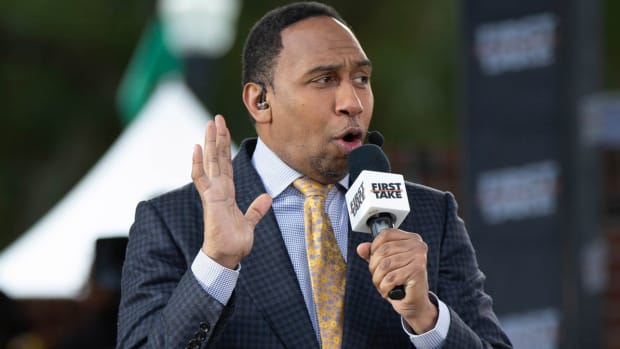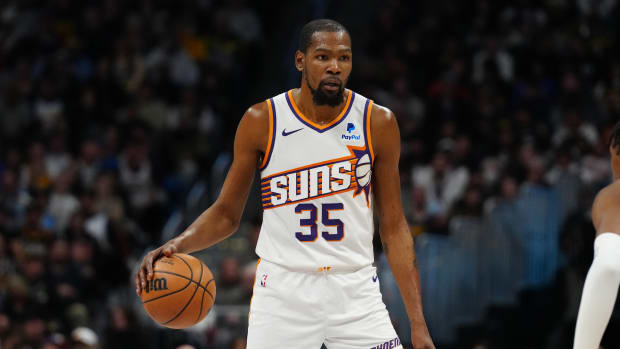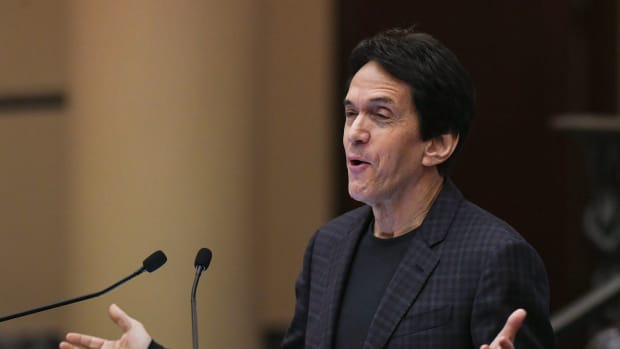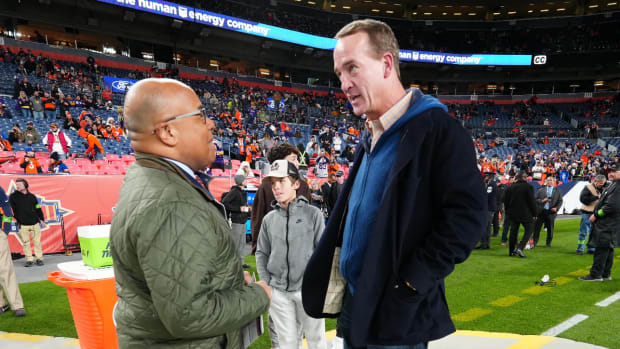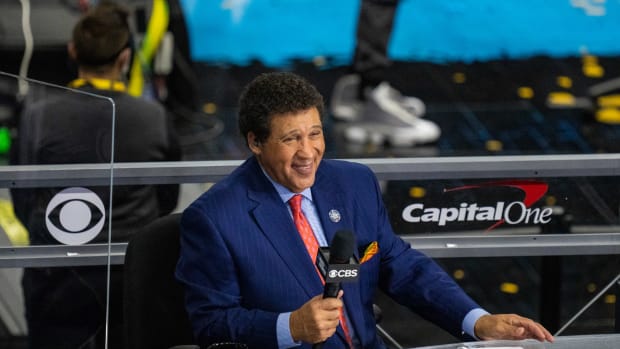As the Game Evolves, MLB Broadcaster John Smoltz Has Become a Topic of Debate
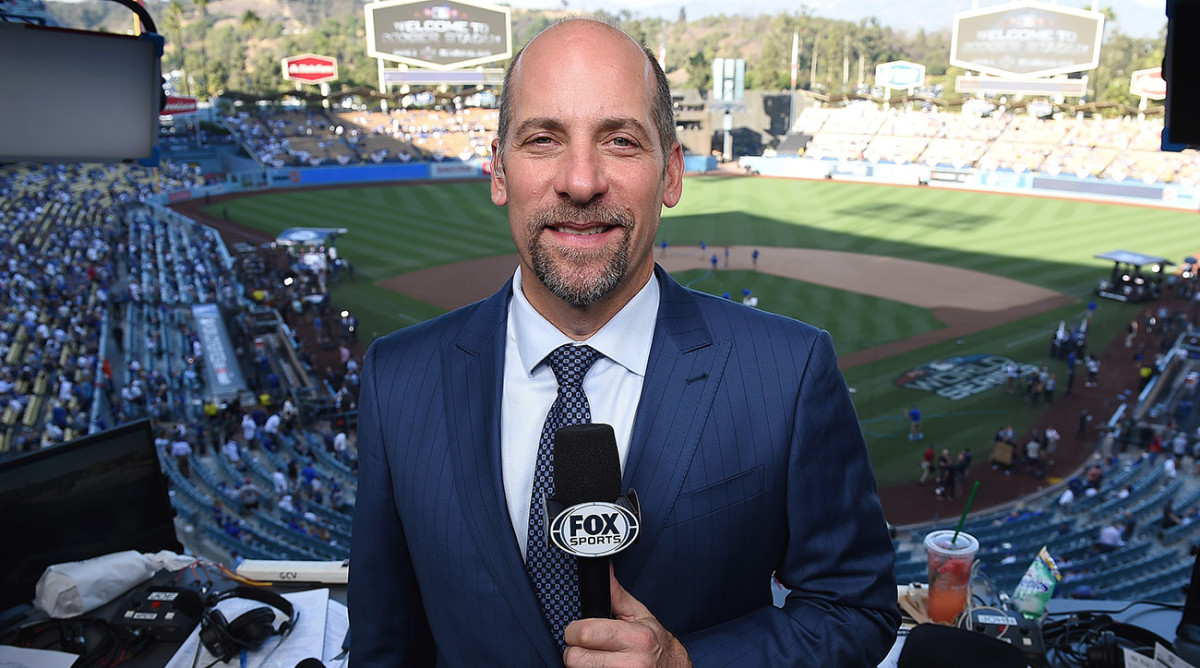
Before Tony Romo, there was John Smoltz.
The only pitcher to record 200 wins and 150 saves in a career moved into the booth in 2010 and was immediately a hit. He was “scary smart” and surprisingly prescient, “the rare ex-athlete willing and able to explain complexities of the craft on TV.”
FOX quickly tapped him for World Series duty alongside Joe Buck. Calling Game 7 of Cubs-Indians in 2016, Smoltz delivered, predicting that Rajai Davis would have a chance on a ball down-and-in before the Cleveland outfielder turned just such a pitch into a tied game in the eighth inning.
Sports Illustrated gave Smoltz its highest grade after the series. Michael Wilbon went even further that fall. “I think I enjoy listening to John Smoltz as much as any baseball analyst I’ve ever heard,” he tweeted, to near unanimous agreement.
Smoltz had changed the game. Then, it seems, the game changed him. Because, by the 2018 Fall Classic, SB Nation’s Marc Normandin was writing “The World Series would be better without John Smoltz.” Tom Hoffarth stretched the Los Angeles Times’ profanity policy while calling for Smoltz’s demotion. Boston Globe columnist Chad Finn received a bevvy of “anti-Smoltz screeds.” Longtime blogger (and ex-Dodgers employee) Jon Weisman didn’t want to bash Smoltz—he appreciates how the former pitcher can seemingly tap into the mind of whoever is on the mound—and yet he still was moved during the playoffs to call the announcer baseball’s unbassador, the wrong voice for the game’s showcase.
Certain fans found Smoltz to be grumpy, or annoying, referring to days gone by rather than predicting the future. The online storm gathered intensity in comment threads and ultimately, of course, on Reddit, as u/MundaneInternetGuy earned over 500 upvotes and 200 comments for a simple question: Does John Smoltz even like baseball?.
Yes. If it needs to be said, John Smoltz loves baseball. He always has. Smoltz bypassed his Michigan State dreams to go directly into the minors as a 22nd round pick in 1985. He underwent four surgeries and recovered from umpteen dislocated shoulders on his way to becoming the 1996 NL Cy Young winner.
A fifth surgery in ‘99, Tommy John, left him advocating for a return to the minors, so he could transition into a closer and extend his career. At 35 years old, he became the NL saves leader in 2002, earning three more All-Star appearances thereafter. Forced to rehab another injury in ‘08, Smoltz began his next transformation, calling four Braves games on Peachtree TV.
“There’s nobody who loves the game more,” says MLB deputy commissioner Tony Petitti. That love just isn’t absolute. “I don’t love everything that baseball is trending to and through,” as Smoltz puts it, feelings he shares regularly on air.
During the NLDS it was Yasiel Puig drawing Smoltz’s ire for flippantly tossing a fly-out back to the infield and then smooching the Braves shortstop after being caught stealing. “What do they say though, the postseason ad, ‘Let the kids play?,’” 31-year-old announcer Joe Davis asked in response.
“To a point,” Smoltz shot back.
1-and-1 the count...
Smoltz saves more distress for data-driven tactics, and the results they’ve wrought. There were 8,000 more shifts in 2018 than the year prior, and partly as a result, 3,000 fewer singles than there were 10 years ago, back when Smoltz pitched. “I think it’s single-handedly killing the game,” Smoltz said of the shift.
Meanwhile, clubs are using 20% more pitchers per game, asking hurlers to throw harder in short stints. Compared to when Smoltz entered the league, games now take 20 minutes longer and include 15% fewer balls in play as the swing and miss rate for batters has risen seven straight years. "The game has gone to a very slow and stagnant pace," Smoltz said last year. "It's going to become unwatchable.”
Amidst frustrating ratings and slipping attendance, the sport could use a salesman calling its biggest games—in fact it’s the announcer’s job to make the game interesting, Bill Baer wrote for NBC Sports last fall. Smoltz would rather be an informer, to the point where even he worries he’s repeatedly stating the obvious.
“You get a sense sometimes that people would wish that, Oh, don’t bring that up,” Smoltz said. “They’re going to have to deal with it and address it I would think if it continues the way it’s going. But imagine doing a game, never sharing one feeling or opinion or having any conversation that has anything to do with what’s going on.” Smoltz can’t.
As for solutions, among the changes he’s discussed, Smoltz has advocated for limiting the shift and reliever use to bring back more classic strategies, as well as potentially awarding playoff berths halfway through the season, which would send the league in a radical direction. He wants to speed up the pace of play and keep players’ emotions in check, giving just about everyone watching something to disagree about.
Smoltz is far from baseball’s most vitriolic pundit, but he has one of the biggest platforms (including a seat on MLB’s competition committee), and he might be the most willing to air his grievances. Smoltz doesn’t go into each broadcast thinking about appeasing any slice of the audience, even if they’re tuning in for a good time. And as the fan base shows signs of splitting, he’s not looking to smooth anything over.
In charge of business and media for the league, Petitti hasn’t pushed back on Smoltz’s mid-game grousing. “I think it's just wrong to say, ‘Okay, we want guys with opinions, but then we only want them if they coincide with what we're thinking about the way the game should be played’,” he said. But, he added, given Smoltz’s role providing the season’s final word doing the World Series, “There's some sense that you want balance there.”
As commissioner Rob Manfred described it, entertaining younger fans without putting off older ones is “a real fundamental tension that we wrestle with every day.” Eighty percent of MLB’s youngest fans approved of bat flips, for instance, compared to just 23% of the sport’s oldest fans. That alone presents a broadcasting pickle. Baseball’s longtime diehards are forced to watch a game they cherish—a summer ritual that was once considered to signify an entire country—change. Its new superfans only know revolution.
MLB Network has added Shift Trax, spray charts, and sac fly lines to its production capabilities, but has also stuck with old-school stats like RBI. “You're trying not to alienate one or the other,” MLB on FOX director Matt Gangl said. “It should be a variety show,” FOX producer Pete Macheska believes.
It really is almost like putting on a presidential debate, MLBN coordinating producer Rich Ciancimino said, balancing viewpoints within segments, shows, and schedules on the channel, in the hopes that everyone can find something to like about today’s game. But in a world where people gorge solely on their specific tastes online, rarely relishing alternate viewpoints, that can instead leave everyone wanting.
If an analyst were to come along, capable of bridging baseball’s current divides, he’d probably look like Smoltz. An All-Star in three decades across two centuries, he faced 29 fellow Hall of Famers as well as 38 still-active players. Yes, he speaks a lot about how baseball used to be, but at 52 years old, he’s actually still a few candles shy of the average MLB viewer.
Smoltz keeps notes both freehand on legal pads and digitally in his iPad’s Goodnotes app. Some see a grouch’s scowl, but behind the scenes, Smoltz has “one of the youngest spirits of anybody I've ever met,” MLB Network host Greg Amsinger said. Taped outside his office, Amsinger has a photo to prove it, featuring Smoltz’s forehead after he cracked his dome open demonstrating a basketball move. There’s still a dent in Amsinger’s door frame to corroborate the story. Smoltz suggested the idea of putting a clock on the home run derby, and he still thinks plenty about how to improve All-Star festivities. It’s not like he’s opposed to fun.
Needing a pick-me-up while suffering from “the crud,” Smoltz grabs … Raisinets and … Mountain Dew. Or maybe the more dramatic way to say that is … Mountain Dew and … Raisinets, depending on whether you had mentally sorted Smoltz with the youngs or the olds.
Smoltz sits somewhere in the middle on the scale of broadcasters’ acceptance of analytic principles, says Statcast guru Mike Petriello. Smoltz has serious qualms, but at least he’s willing to listen. He spent an hour with MLBN lead researcher Nate Purinton in January hashing out the merits of new stats like wOBA. He spent four more in March going back and forth with Petriello on exit velocity and expected batting average.
Still selling Statcast’s virtue to commentators across the country, Petriello has seen the philosophy sweep through team clubhouses. Players can no longer deny the results. Soon enough, those guys will be populating broadcast booths; maybe then numbers will get a fair shake and a happy medium will emerge. That said, the game likely will have evolved again, too. Plus, whoever is calling the action will be speaking to an even more fragmented audience.
Smoltz is the closest thing baseball has to a No. 1 voice, but in a sport that has become increasingly regionalized since the spread of regional sports network 30 years ago, that’s a perilous distinction. Fans now have closer relationships with their local broadcasters or their chosen online writers, spending full seasons with them while Smoltz drops in on Saturdays and for the playoffs. If the most locked-in World Series viewers are watching because they’re more invested in one of the two teams over the sport as a whole, it makes sense that they’d chafe at Smoltz’s regular desire to talk big picture issues rather than focusing on the teams’ standout successes.
Three years ago, Smoltz and Petriello sat together on-set during a broadcast that would portend what was to come. Along with Brian Kenny and Jonah Keri, they offered an alternative viewing experience for a Pirates game “with a sabremetric spin.”
Experimental broadcasts have since become an industry-wide trend. Petriello featured on a well-received ESPN2 Statcast presentation of the 2018 NL Wild Card game. ESPN has more recently played with streaming NBA styles. The league itself handed games over to influencers. Twitch did the same for Thursday Night Football. Amazon called in Andrea Kremer and Hannah Storm for additional TNF alt-coverage. And so on. The web has created the demand, and allowed the supply, of increasingly niche presentations. FOX has not tested as much, but its investment in a streaming platform, combined with recent negotiations to carve out rights for said site, indicate that its leaders could see a similar future.
Dueling shows, of course, aren’t new. Big games are usually presented in English and Spanish. More than that, almost every MLB, NBA, and NHL game is handled by home and away crews, providing fans with an allied perspective. “That's been the bane of my existence,” Buck said. “I mean, if you go online right now, I've pissed off every fanbase because I'm not there for them.” Now the 50-year-old has a new set of factions (can we call them fanctions?) to enrage: the old-school and the new. There’s a clear need for one more feed, then, providing a millennial perspective—speaking the modern tongue.
As MLB general managers’ average age has dropped nearly as much as viewers’ average age has risen, it feels like the center cannot hold. Slightly upsetting everyone might be the sign of a good boardroom compromise. It doesn’t make good TV. Here, when the ground ruptures, the last place you want to be is straddling the fault line.
“I still believe that it will self-correct whatever it needs to self-correct,” Smoltz said, optimistic, making one more prediction. “The trends that are out there now may not be the ones that are out there in for four or five years.”
He’s talking about the game, of course. Because that’s what changes. People, not so much.

